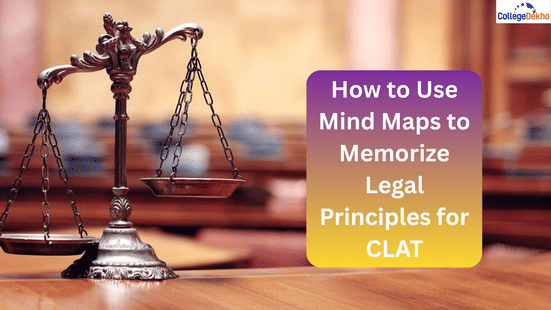The most tested topics from legal principles in CLAT are contracts, torts, criminal law and constitutional law. To memorize them for CLAT you can use mind maps highlighting the keywords and phrases.

In the CLAT exam the purpose behind the legal principles section is to test your ability to comprehend legal concepts and apply them logically. Most of the questions asked from this section are passage based questions testing legal principles and few are reasoning based requiring no prior knowledge of the principles. The common areas which are in focus in CLAT are contracts, torts, criminal law and constitutional law. To comfortably sale over this section it is recommended to use CLAT legal principles mind maps. As you have seen in mind maps that the use of keywords and key phrases are common, this technique will enable you to remember the principles thoroughly. You can go through this article to know how you can use mind maps to efficiently memorize key principles.
Also Read: Preparation Tips for CLAT 2026 Legal Reasoning SectionWhat are Legal Principles?
Legal Principles are the general rules and laws that are applied mostly in factual situations. The purpose behind this section in the CLAT exam is to test your comprehension skills, your ability to apply law to facts and using logical reasoning to derive conclusions in a particular situation.
Types of Legal Principles in CLAT
Check below to know the types of legal principles.
Legal Principles | Details |
|---|---|
Law of Torts |
|
Law of Contracts |
|
Criminal Law |
|
Constitutional Law |
|
Miscellaneous |
|
Also Read: CLAT Toppers Preparation Tips
How to Memorize Legal Principles for CLAT using Mind Maps?
Follow the technique as mentioned in the below table.
Particulars | Details |
|---|---|
Start with the Central Theme |
|
Structure of a Legal Mind Map |
|
Add Key Elements to Each Branch | For each subtopic, break it into smaller nodes, for example,
|
Use Case Laws as Anchors | Attach landmark cases under each principle. For example,
|
Chunking for Memory |
|
Revision Strategy with Mind Maps |
|
Also Read: CLAT 2026 Important Topics & Subject Wise Weightage
How to Approach Legal Principles Section?
You can follow this strategy to prepare for legal principles section.
Particulars | Details |
|---|---|
Read the principle |
|
Analyse the facts carefully |
|
Apply principle to facts | Match the facts to the conditions stated in the principle |
Eliminate incorrect options |
|
Also Read: How to Score 100+ in CLAT 2026?
For one on one consultation with our experts call us on our toll free number 1800-572-9877. You can post your doubts on our QnA zone . Feel free to write to us through our Common Application Form .
Are you feeling lost and unsure about what career path to take after completing 12th standard?
Say goodbye to confusion and hello to a bright future!

FAQs
Ideally, one principle per mind map for clarity. But related doctrines (e.g., Assault, Battery, False Imprisonment) can be grouped together.
Since mind maps visually display conditions + exceptions, you can quickly match them with fact situations during problem-solving.
Definitely. Adding one or two landmark cases makes the principle easier to recall and strengthens application skills for passage-based questions.
They break down lengthy principles into keywords, examples, and applications. This visual structure allows faster revision and prevents information overload.
Was this article helpful?


















Similar Articles
IB ACIO Tier 1 Expected Cutoff 2025: UR, OBC, SC, ST
MP Police ASI and Subedar Recruitment 2025: Vacancy Details, Notification, Application Form, Exam Date, Syllabus
SSC CGL Tier 1 Expected Cutoff Marks 2025: UR, EWS, OBC, SC, ST
SSC CGL Exam Analysis 2025: Day-wise question paper analysis
SSC CGL Tier 1 Result 2025: Expected Date, Qualifying Marks, Tier 2 Exam Date
SSC CGL 2025 Post-Wise Vacancies: Category-Wise Details, Pay Scale